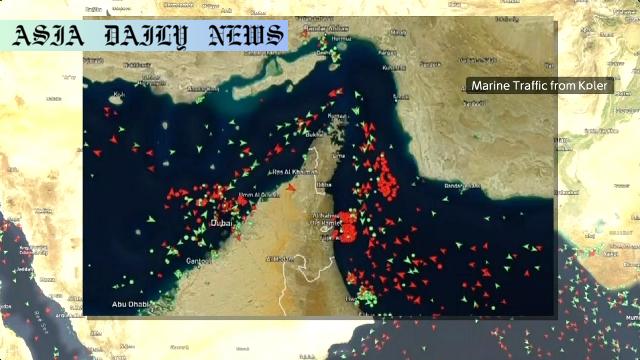Persian Gulf: Japanese shipping firms take proactive measures to enhance vessel safety amidst escalating geopolitical tensions.

Proactive Steps by Japanese Shipping Firms Amid Rising Geopolitical Tensions
In the wake of intensifying geopolitical concerns centered on the Persian Gulf, two major Japanese shipping giants, NYK Line and Mitsui O.S.K. Lines, have adopted precautionary measures to safeguard their operations. The Persian Gulf, an economically critical shipping route, now poses significant risks to maritime activities following recent developments. Reports indicate that US strikes on Iranian nuclear facilities have led to heightened vigilance, prompting Japanese firms to strategically guide their vessels to minimize time spent in high-risk zones, particularly around the Strait of Hormuz.
NYK Line, a key player in global shipping, operates approximately 20 tankers and automobile carriers in this region. Their decision to alter operational protocols stands as a testament to their commitment to risk management. Similarly, Mitsui O.S.K. Lines, with over 15 vessels, including oil and natural gas tankers, has significantly tightened its monitoring measures, deploying highly experienced captains and leveraging advanced strategies from a round-the-clock operations center in Tokyo. Both organizations have prioritized the safety of their crews and cargo amidst turbulent circumstances.
Why the Persian Gulf Remains a Focal Point for Global Shipping
The Strait of Hormuz, a narrow and critical chokepoint in the Persian Gulf, facilitates the transportation of roughly 20% of the world’s oil supply. Consequently, it has a pivotal role in the global economy. Recent US-Iran tensions have further highlighted its strategic importance and vulnerability. The actions of Japanese shipping companies underscore an emerging trend of critical infrastructure adapting defensively in response to global conflicts. The safety instructions imposed on NYK Line and Mitsui O.S.K. illustrate the reactive measures prominent shipping companies must take to ensure seamless trade amidst adverse circumstances.
Both firms have also implemented continuous surveillance systems, highlighting the increasing reliance on advanced monitoring technologies. These innovations play an influential role in navigating the complexities of a region rife with historical and geopolitical instability. As tensions persist, the global shipping industry will likely continue to evolve its strategies, prioritizing adaptable and dynamic safety protocols.
Broader Implications of Tensions in the Persian Gulf
The safety measures implemented by Japan’s leading shipping firms are not isolated occurrences. Instead, they are reflective of larger shifts within the global maritime industry. As countries grapple with evolving geopolitical realities, including trade disruptions and military conflicts, the emphasis on safeguarding supply chains has intensified. The Persian Gulf’s volatility accentuates the need for international actors to work collaboratively in promoting regional stability.
Notably, these developments also present opportunities for technological growth within the industry. Advanced tracking systems, real-time data, and predictive analytics allow companies to make informed decisions even amidst uncertainty. As the global economy pivots towards digital transformation, maritime players at the industry’s forefront, such as NYK Line and Mitsui O.S.K., could emerge stronger given their proactive approach.
Commentary
Analyzing Japanese Shipping Firms’ Strategic Move
Recent developments in the Persian Gulf have underscored the persistent geopolitical risks inherent to global shipping routes. The decision by NYK Line and Mitsui O.S.K. Lines to minimize vessel exposure in the Persian Gulf is not just a reflection of safety concerns but also a demonstration of proactive risk management. As critical players in the maritime industry, their adaptive strategies highlight a capacity for resilience and foresight amidst heightened uncertainty.
The Persian Gulf remains an indispensable hub for global trade, particularly due to its role in transporting a significant portion of the world’s energy supply. However, its vulnerability to geopolitical tensions has never been more apparent. The US-Iran conflict acts as a stark reminder of the interconnectivity between regional security and economic stability. NYK Line and Mitsui O.S.K. Lines have provided an example of how industry giants can prioritize crew safety while maintaining operational efficiency during volatile times.
The Role of Technology in Mitigating Risks
An interesting dimension of this development is the critical role advanced technology plays in mitigating operational risks. Mitsui O.S.K.’s use of a dedicated safety operations support center staffed by highly experienced captains demonstrates a forward-thinking approach to maritime challenges. As disruptive global events persist, leveraging predictive analytics and round-the-clock surveillance tools will become increasingly important for shipping companies to navigate uncertainty while ensuring economic continuity.
Moving forward, it is imperative for other stakeholders in the maritime industry to monitor these developments and adopt similar practices. The flexibility with which NYK Line and Mitsui O.S.K. Lines adapted their strategies offers valuable lessons for the broader sector on the importance of vigilance, technology adoption, and prioritizing safety in ensuring resilience against unforeseen geopolitical shocks.


